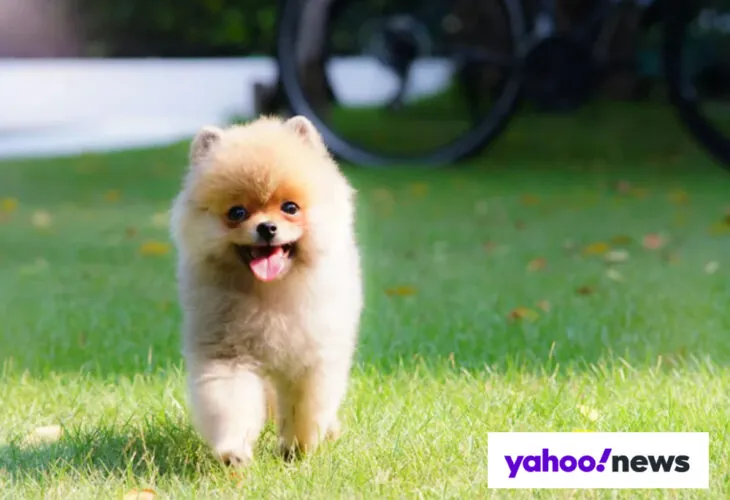Choosing the right canine companion is a significant decision, especially for seniors seeking a furry friend to share their golden years. Small breed dogs often make ideal companions due to their manageable size, lower exercise requirements, and affectionate natures. Let’s explore some of the best small dog breeds for seniors, offering a blend of companionship, joy, and manageable care.
The bond between humans and animals is well-documented, with pet ownership linked to reduced stress, lower blood pressure, and increased social interaction. For seniors, these benefits are amplified, providing a sense of purpose, reducing feelings of loneliness, and encouraging physical activity. When considering a small dog, seniors can find a loyal friend that fits comfortably into their lifestyle. But before that, consider checking out these dog breeds good for seniors.
 A senior woman smiling while petting a small white dog sitting on her lap.
A senior woman smiling while petting a small white dog sitting on her lap.
Here are 15 of the best small dog breeds for seniors:
1. Cavalier King Charles Spaniel
Known for their gentle and affectionate nature, Cavalier King Charles Spaniels are excellent companions. They adapt well to different lifestyles and enjoy cuddling just as much as short walks. Their friendly temperament makes them great for seniors seeking a loving and easy-going pet.
2. French Bulldog
French Bulldogs are playful, adaptable, and relatively low-energy, making them suitable for seniors with limited mobility. Their comical personalities and affectionate nature provide endless entertainment and companionship.
3. Pug
Pugs are charming, affectionate, and thrive on human interaction. Their small size and moderate exercise needs make them ideal for apartment living or seniors who prefer shorter walks. Be mindful of their breathing and keep them cool in hot weather.
4. Shih Tzu
Shih Tzus are bred to be lap dogs, making them perfect companions for seniors. They are affectionate, gentle, and enjoy being pampered. Regular grooming is essential to keep their long coats healthy and mat-free.
5. Maltese
Maltese dogs are gentle, playful, and hypoallergenic, making them a great choice for seniors with allergies. They are small, affectionate, and enjoy spending time with their owners. Regular grooming is necessary to maintain their beautiful white coats.
6. Dachshund
Dachshunds, with their distinctive long bodies, are loyal and entertaining companions. They come in various sizes and coat types, allowing seniors to choose a dog that fits their lifestyle. Be mindful of their back health and avoid excessive jumping. Seniors looking to adopt older dog near me might find a Dachshund needing a loving home.
7. Yorkshire Terrier
Yorkshire Terriers are small, affectionate, and adaptable to apartment living. They are known for their playful personalities and loyalty to their owners. Regular grooming is required to keep their long, silky coats in good condition.
8. Pomeranian
Pomeranians are small, fluffy, and full of personality. They are intelligent and alert, making them good watchdogs. While they have moderate energy levels, their small size means they can get sufficient exercise indoors.
9. Chihuahua
Chihuahuas are the smallest dog breed, known for their big personalities and loyalty to their owners. They are relatively low-maintenance and can thrive in small living spaces. Be mindful of their sensitivity to cold weather.
10. Miniature Poodle
Miniature Poodles are intelligent, hypoallergenic, and eager to please, making them highly trainable. They enjoy walks and playtime, but their small size means they don’t require excessive exercise. Consider that the best house dog for seniors could be a poodle.
11. Bichon Frise
Bichon Frises are small, fluffy, and known for their cheerful personalities. They are hypoallergenic and relatively easy to train. Regular grooming is essential to maintain their white, cloud-like coats.
12. Cavalier King Charles Spaniel
Cavalier King Charles Spaniels are known for their gentle and affectionate nature, making them excellent companions for seniors. They are adaptable and enjoy both cuddling and short walks.
13. Miniature Schnauzer
Miniature Schnauzers are intelligent, energetic, and have a distinctive appearance. They are relatively low-shedding and require regular grooming to maintain their wiry coats. These dogs also have a low shedding rate and do not require excessive grooming, making them easier to care for. In addition, their compact stature makes them easier to handle and transport, while also allowing them to thrive in apartments without taking up too much space.
14. Beagle
Beagles are affectionate and loyal dogs, which makes them provide good companionship to older adults. In addition, their short coat makes them low maintenance and their moderate size makes them suitable for various living situations, including apartments or homes with limited space.
15. Havanese
Havanese are charming dogs. They are sociable, friendly, and highly trainable. Their miniature size and moderate exercise needs make them perfect for older people.
Factors to Consider When Choosing a Small Dog for Seniors
- Energy Level: Choose a dog with an energy level that matches your own.
- Grooming Needs: Consider the amount of grooming required to keep the dog healthy and comfortable.
- Trainability: Opt for a breed that is relatively easy to train and eager to please.
- Health Issues: Research common health issues associated with different breeds and be prepared to provide necessary care.
- Living Situation: Ensure the dog is well-suited to your living environment, whether it’s an apartment or a house with a yard.
Conclusion
Selecting a small breed dog can bring immense joy and companionship to seniors. By carefully considering factors such as energy level, grooming needs, and trainability, seniors can find the perfect furry friend to enrich their lives. Remember that there are many small dog breeds for seniors that would be happy to find their forever home. With the right companion, seniors can enjoy the numerous benefits of pet ownership, including reduced stress, increased social interaction, and a renewed sense of purpose.
